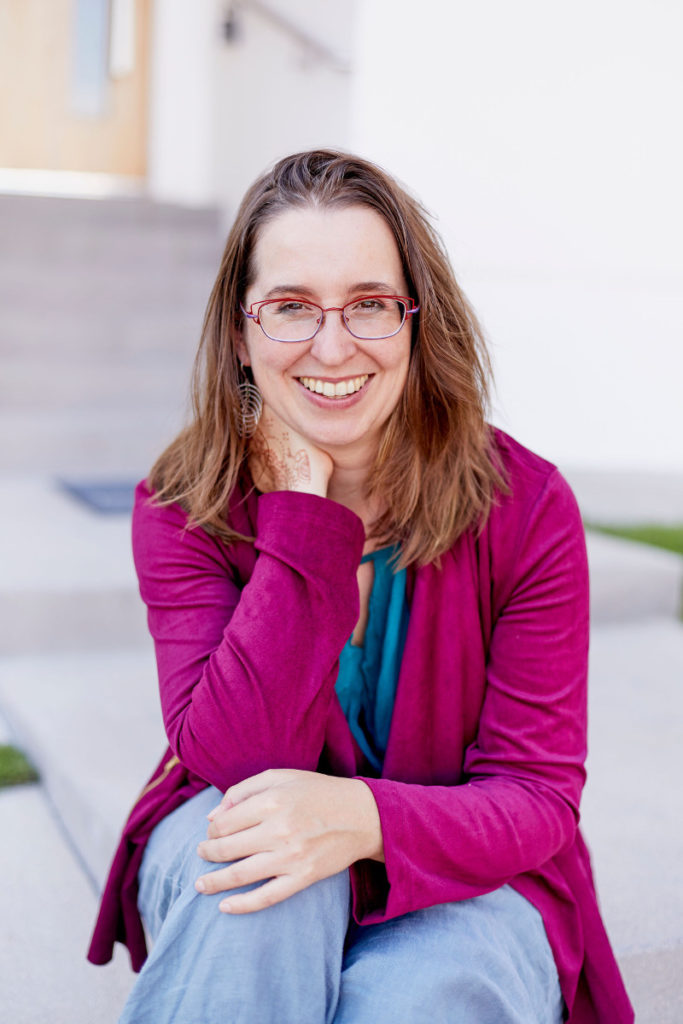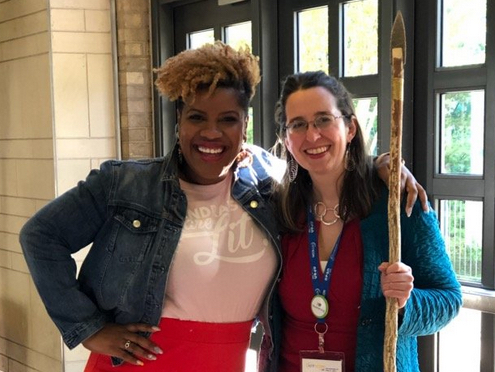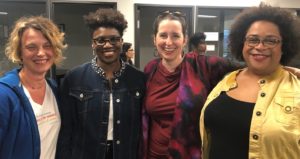
(November 5, 2020) Mazarine Treyz has an answer to the question many white people have been asking of Black, Indigenous and people of colour in the wake of the racial and economic injustice laid bare by the pandemic and police violence. What can I do?
As the sole proprietor of a business offering online education to prospective leaders in the nonprofit sector, Treyz decided to create an online conference The New Power Fundraising Conference, scheduled for November 11—13, 2020, where a large majority of the presenters are Black, Hispanic, Asian women of colour from Canada, Spain, the UK and the U.S.
Marazine Treyz is part of a work-place justice movement to create better work culture in the nonprofit sector. She lives in Portland Oregon, an inadvertent ground zero for U.S. protest against police violence.
Writer Candace Pires shared her experience in re-locating to Portland from the U.K. in 2015 for The Guardian. Of recent developments, she wrote,
Then in May, Portland, like many other cities, held nightly Black Lives Matter protests in response to the killing of George Floyd. Thousands of people gathered in predominantly peaceful protests, but small groups who damaged property grabbed headlines and the president’s attention. In July, federal police were sent in to stop “the riots”, and acting homeland secretary Chad Wolf described Portland as a “city under siege”. Protesters were snatched off the street by unmarked police cars, teargassed and charged with no warning. Trump described Portland as a “beehive of terrorists,” labelling protesters “professional anarchists” and “people that hate our country”.
“Living in Portland, people were being snatched off the street by people who didn’t have any clear identification,” says Treyz.
“For six months, I was depressed, realizing how based on white supremacy the nonprofit sector is. We are not focused on justice. And when we look at who is asked to speak at these nonprofit conferences, we mostly see the same white faces.
“I also see in spaces geared towards Black women, where the conversation about equity is being appropriated and co-opted by white people, even the conversation about white supremacy.
“We need to go into the dark places of the soul and learn how we move forward as a sector.”
Treyz wants us to walk this path together.

The New Power Fundraising Conference features unique sessions such as The Goodness of Grief by Kierra Taplin in Atlanta, GA; Building a dedicated online community with heart by Kishshana Palmer in New York; Understanding power, Seeking Accountability, and Organising for Change by Saba Shafi in the UK; and Black Women’s Experiences in Fundraising by Nneka Allen in Toronto.
“My path to this place started when I was working for the Economist in New York City and volunteering for Planned Parenthood,” says Treyz.
“But after 9/11 I wanted to do something that focused on really helping people, so I went to Indonesia, worked in an orphanage, and learned to write grants. Then I helped a friend start a nonprofit. And I did some courses at Harvard and the Foundation Center. Then I came out west and began a string of nonprofit jobs, moving from organization to organization. I found a white-led, white-priorities toxicity existing at every level. Having the language to describe white supremacy on the inside of our organizations as well as the outside makes a difference.
Treyz believes we have to keep unlearning white supremacy in order to figure out how to build a just sector.
“In my experience, nonprofits often do bad business. In his book, Bookshit Jobs, David Graeber, [an anthropologist at the London School of Economics] includes the nonprofit sector.”
Graeber describes bullshit jobs as “a form of paid employment that is so completely pointless, unnecessary, or pernicious that even the employee cannot justify its existence even though, as part of the conditions of employment, the employee feels obliged to pretend that this is not the case.”
“Profiting from misery or offering shelter, not sanctuary, could be called bullshit jobs,” says Treyz.
In the past five years, Treyz has directed eight online conferences on careers and nonprofit leadership, and written three books—The Wild Woman’s Guide to Fundraising, The Wild Woman’s Guide to Social Media, Get the Job! Your Fundraising Career Empowerment Guide.
“I like to work with founders, people who are doing new things, being active in learning how to act in solidarity with the movements for racial, gender and climate justice.
“The difference between my conferences and others is that we pay our speakers, have people from outside the sector who wouldn’t normally be presenting, and we have lots of information on new digital media.
“I am one person, but I can host international online conferences, and give a platform to highlight women of color.“
The presidency of Donald Trump has turned the world upside down, and the people living and working in the U.S., in addition to those of us in the rest of the world to a slightly lesser degree, have been dealing with a relentless hurricane-level political storm.
“We have lost a lot in the last four years, with the rise of overt white supremacy, the global movement for black lives in response, the ravaging of the west coast fires due to climate change, and the global pandemic,” says Treyz.
“We need to grieve this year, rest, breathe, then dream a new world together. One thing patriarchy can never take is our imaginations.”
After a long and difficult election conducted under increasingly concerning pandemic conditions, it seems clear, at this moment, that Joe Biden and Kamala Harris will win enough electoral votes to secure the presidency.
Living in the wake of the election storm, Treyz quotes Tricia Hersey, the founder of The Nap Ministry. Hersey writes,
“I don’t feel a sense of dread or anxiety. My hope and joy is internal and not built upon the shenanigans of the White House. I’m firmly planted in imagination and the beauty of my own liberation. I’m sipping tea and daydreaming. I refuse to let white supremacy politics gaslight me into despair.”

Treyz says that we have to be clear on who is contributing to increased white supremacist activity and the receptiveness to misinformation that has caused the unnecessary sweep of an uncontrolled pandemic.
“White American women are doing this,” she says. “I am part of a population that is making this election so hard. We white people, and leftist white women specifically, have to talk with conservative white women and get them to see how they are voting against not just the future of our country, but their own self-interest. I don’t have the answer for how this happens. I do know that many women in rural areas feel powerless, isolated, and angry. They do not want ‘coastal elites’ making decisions for them.”
Underneath it all, Treyz believes it’s a matter of ‘class war.’
“To help make a more just society, stop class war, keep people safe, fed, housed and not working in dangerous conditions during the pandemic, I advocate for universal basic income for the US and Canada,” she says. “This was being piloted in a suburb of Toronto until the Ford government shut down, but the results were positive for as long as the experiment ran.”
She says nonprofit leaders who do not want to get on board with racial justice are going to be left behind in the next 10 years.
“This year [the U.S. has] elected a vice president whose mother and father were immigrants from India and Jamaica. Half of the children in the US are non-white in 2020, and that number is only trending upward.
“My goal in the next five years is to see more racial and gender justice in nonprofit leadership, better pay, less precarious work for women, and an acknowledgement of the three pillars of white supremacy as we work to dismantle them in our minds and in our everyday operations,” concludes Treyz.
The New Power Fundraising Conference, scheduled for November 11—13, 2020, is open for registration.